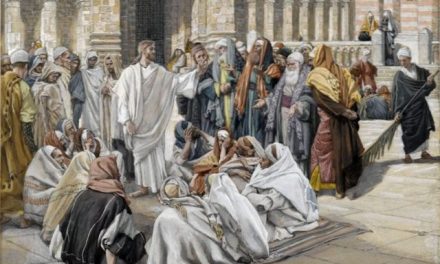First Reading – 1 Samuel 26:2, 7-9, 12-13, 22-23
Responsorial Psalm – Psalm 103:1-2, 3-4, 8, 10, 12-13
Second Reading – 1 Corinthians 15:45-49
The theme that stands out to me from this week’s readings is mercy.
The point is immediately obvious in the responsorial Psalm. “Merciful and gracious is the Lord,” who has generously separated us from our transgressions “as far as the east is from the west.”
Certainly, this traditional sense of mercy, where we think of mercy as forgiveness, is part of the readings. “Stop judging and you will not be judged,” the Gospel insists. “Forgive and you will be forgiven.” It is easy to see a call to mercy, in the colloquial understanding, on display.
I also see a more technical sense of mercy, however—the kind of mercy that preoccupied the Roman philosopher Seneca when he addressed Nero not long after Jesus’s death.
In De Clementia (On Mercy), Seneca presented mercy not simply as forgiveness, but as a conscious choice on the part of someone with power to do something less than their official powers would allow. In effect, he described mercy as the decision not to flaunt one’s power, and essentially argued that the best leaders were the ones who mercifully shifted the question from, “What can I do in this situation?” to “What should I do in this situation?”
This account of mercy is readily apparent in the first reading, where David, locked in what is essentially a vicious battle over the transfer of power in the Kingdom of Israel (an imperfect paraphrase, but it gets the idea across), comes upon Saul, who has clearly been trying to harm him, in an especially vulnerable position.
In this moment, David has all the power, and his nephew and advisor encourages him to wield that power to its full extent. David, however, recognizes that just because one has the power to do something, it does not mean that one should in fact do that thing.
Appreciating the importance of Saul as “the Lord’s anointed” (for Saul was, after all, the first human king of Israel) David chooses to make a point about his power and the way he would use it. Rather than exploiting another’s vulnerability, he chose to do less than he could to make the next chapter in the Saul and David story possible.
Importantly, this application of mercy shows a close link between mercy and justice, at least in a particular Christian understanding. Justice in the biblical sense is defined as “right relationship,” and David’s merciful decision served this end by allowing a relationship to develop when enmity had been all that was possible before.
The readings, then, show how mercy can be at the service of justice in the Christian tradition. And not only that, they also show how acting out of mercy in this way is incumbent on those who claim to be followers of Jesus. (Reminds me of the way the Jesuit moralist Fr. Jim Keenan described mercy as “the heart of Catholicism.”)
Contrasting “the first man, Adam” and “the last Adam” (i.e., Christ), the second reading from St. Paul’s first Letter to the Corinthians reminds us that “just as we have borne the image of the earthly one, we shall also bear the image of the heavenly one.”
In other words, we are like our first ancestor, and we are called to be more like our perfect model. One important way we do that is by embracing the merciful use of power God demonstrates in the divine dealings with us and that Jesus embodied in his ministry on earth. Thus the exhortation, “Be merciful, just as your Father is merciful.”
For the week ahead, then, perhaps we can prayerfully reflect on the ways we have power in our lives and ask what it might mean to wield that mercifully, doing less than the maximum our power would allow so that we can better serve the restoration of right relationships around us—with God, with our neighbors, with creation, and ourselves.





